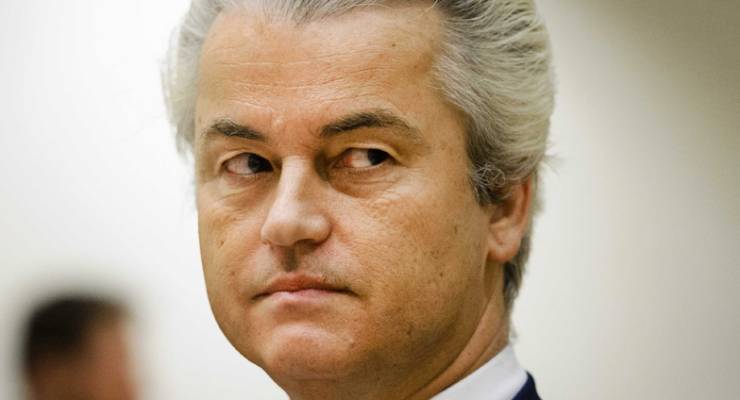
Following an “urgent review” of his visa by Department of Immigration authorities, Shiite cleric Farrokh Sekaleshfar pre-empted any decision and left the country overnight.
Sekaleshfar was quoted in a 2013 talk at the University of Michigan as saying the death penalty was appropriate for homosexuals in certain cases. Malcolm Turnbull said there was no place in Australia for people who “preached hate”, and Immigration Minister Peter Dutton welcomed Sekaleshar’s decision to leave on Sky this morning — but there is no indication that Sekaleshfar had any problems with his visa before the Orlando massacre.
Sekaleshar is only the latest in a long line of activists, academics and artists who have encountered issues with Australia’s Migration Act, particularly the “character test” contained in section 501 and the broad power it gives the immigration minister.
David Irving
The Holocaust “revisionist” historian applied for entry into Australia several times between 1992 and 2000, each time unsuccessfully. The initial ban was on the grounds Irving was “likely to become involved in activities disruptive to the Australian community or a group within the Australian community”. In 2006, Irving served 13 months of a three-year sentence in Austria for Holocaust denial.
Tyler, the Creator
The violent, sexist and homophobic images in the shock rapper’s lyrics were the focus of a campaign from pop culture feminist group Collective Shout — whose website refers to him as a “pro-rape misogynist” — in the lead-up to his 2015 tour. As authorities considered whether to revoke his visa, Tyler abandoned his tour, tweeting Collective Shout leader Alison Coralie “you won” and claiming he had been banned. Tyler responded to the controversy in song, with Fuck It (language warning, obviously) taking searing aim at, among other things, Australia’s customs laws (“Tell Australia I’m sneaking in with a mic in my damn hand/instead of the vegetables that I packed in my backpack.”) Just as Johnny Cash never actually shot a man in Reno, Tyler, the Creator, has no criminal convictions (he was arrested for “inciting a riot” at South by Southwest music festival in 2014, but the charges were later dropped), unlike other artists to be recently denied entry to Australia, such as Snoop Dogg or Chris Brown.
Troy Newman
The anti-abortion activist had his visa revoked while he was en route to Australia in late September 2015, on the grounds he posed a risk to public safety. This was justified with a passage from his 2003 book Their Blood Cries Out, in which he argued that doctors who perform abortions were murderers and therefore should be subject to the death penalty. Undeterred, Newman came to Australia anyway, and was promptly deported after a few days in detention at Melbourne Airport.
Geert Wilders
The Dutch politician, who favours a ban on all “Islamic immigration” to Western countries, travelled to Perth to help launch the Australian Liberty Alliance, a minor political party dedicated to “stopping the Islamisation of Australia”, in October 2015. Wilders has famously compared the Koran to Mein Kampf. There were calls for him to be banned from the country, which were ultimately not heeded. The party launch went ahead at a secret location with no media in attendance, but Wilders fronted a media conference in the fern garden at state Parliament to announce ALA’s Senate candidates.
Julien Blanc
The “pick-up artist” who runs the Pimp My Game website was initially successful in his application to travel to Australia for a series of seminars on seducing women in October 2014. His courting tips included various acts of abuse. Public outcry followed, and then-immigration minister Scott Morrison revoked his visa and he was forced to leave. In February 2016, Return Of Kings neo-masculinist Daryush “Roosh” Valizadeh, who argued rape should be legal on private property, vaguely mooted a series of “tribal” meetings in Australia. Dutton was petitioned to deny him a visa, but Valizadeh cancelled his trip before applying.
Eminem
Rapper Eminem has toured Australia in 2001, 2011 and 2014. There have been protests each time, but he’s always been allowed in. Like Tyler, the Creator, the controversy focused largely on the content of his lyrics. Unlike Tyler, Eminem actually has a criminal conviction to his name. Also unlike Tyler, the Creator, Eminem is white. Make of that what you will.








One more person I’m proud Australia denied a visa to: Sherri Tenpenny, the pro-disease advocate. You may have heard of her, she thinks vaccines cause autism, ADHD, etc.
Surely Geert Wilders is physically suited to being a Bond villain rather than a social one.
I’m SO glad I’m not the only one who sees the Max Zorin resemblance…
Dutton churns out more hate language than anyone, can we turf him out?
Shame that Eminem got in, but really, who wants any of those people allowed in to preach rubbish?
Eminem got in because he was just a poor white boy trying to be somethin’ he ain’t, so he needs some protection, know what ahm sayin’ It was only a blade anyways, like on the streets of 8 mile he would have a cap up his ass so quick he couldn’t pull nothin’.
Tupac Shakur and Snoop Dogg man, they know how to roll___
(Plus Eminem really has nothing to say___)
As a generaal principle I would rather let anyone, however hatefully ignorant and repellent, enter and speak so long as they can be countered.
Fresh air is the best disinfectant for loathsome ideas.
I couldn’t agree more. The BNP kept winning a few seats here and there in the UK, until their leader was given an hour on the BBC, and only then did the voters notice that he was bonkers.
By no-platforming thoughtcriminals, you only help build their followings, by turning them into victims.
Sunlight is the best disinfectant.